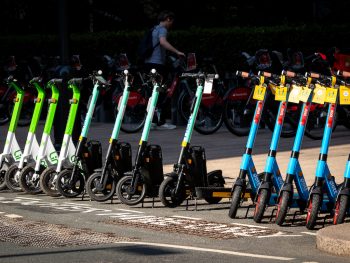Government responds to e-scooter trials evaluation report
The Department for Transport has published its response to e-scooter trials in England, which found that 14.5 million rental e-scooter trips were completed by December 2021.

The DfT said the trials had shown that rental e-scooters can serve as a valuable mode of transport, with 14.5 million rental e-scooter trips completed by December 2021
The trials were launched in July 2020 in 32 areas across England and the DfT commissioned an independent evaluation of the projects to examine how and why rental e-scooters are used, and by whom, as well as safety, mode shift, environmental and wider social impacts.
The evidence will inform future e-scooter policy – earlier this year the Government said it was looking to bring in new legislation that will legalise private e-scooters as a priority for the upcoming year, although such a Transport Bill has been delayed since then to evaluate the findings from the trials.
In its response to the evidence, the DfT said it welcomed the conclusion that rental e-scooters can serve as a valuable mode of transport. Key findings include an increased use of rental e-scooters for purposeful journeys, such as commuting, and a progressive increase in mode shift away from private vehicles as trials matured.
The research also showed that rental e-scooters were providing access to new travel options for some groups, with people from ethnic minority groups and on low incomes more likely to use e-scooters regularly.
And the majority of residents in trial areas saw the introduction of e-scooters in their area as positive.
Not all was positive though and data indicates that the frequency of rental e-scooter collisions was higher during 2021 than for pedal cycles (including bicycles and e-bikes), though this was likely to be driven in part by the novel nature of the mode. Survey findings indicate that collisions were more likely to occur among less experienced users, making it difficult to make like-for-like comparisons with more established modes.
E-scooter and other road users also raised concerns around technical elements of the e-scooter design such as e-scooter audibility, visibility and acceleration.
And some members of the public raised concerns about the behaviour displayed by riders, with pavement riding causing particular concern among with pedestrians with mobility issues and blind or partially sighted individuals.
The DfT has already used some of the report’s findings to make changes, including mandatory unique identification numbers for all rental e-scooters, enabling members of the public to differentiate trial from non-trial e-scooters. There is also increased guidance and encouragement for operators to provide helmets and incentivise their use.
The findings will also be used to inform a decision on whether and how e-scooters might be legalised in the impending Transport Bill, mentioned in the Queen’s Speech this year and now due late next year.
Richard Dilks, chief executive of national shared transport charity Collaborative Mobility UK (CoMoUK), welcomed the DfT response, saying: “There are sustained levels of popularity for this new alternative transport option, with e-scooters an important part of the shared transport offer that will help people save money and cut emissions.
“It is critical to good practice that data from the e-scooter trials has been published, so we welcome publication of this response.
“However, we remain disappointed that the planned Transport Bill is delayed again and we urge the Government to give it priority in the next parliamentary session so that the full opportunities of powered light vehicles can be unleashed as part of the UK’s transition to a lower-emission transport sector.”












